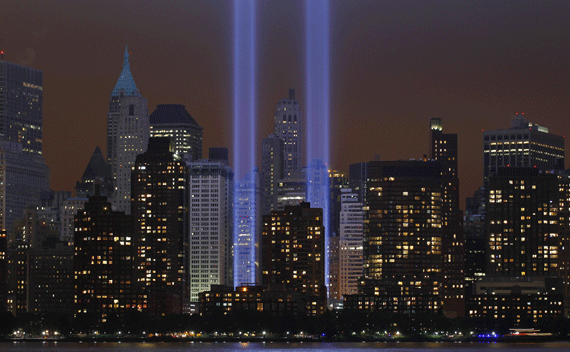
I am in the middle of reading In Uncertain Times: American Foreign Policy after the Berlin Wall and 9/11. The book emerged from a conference sponsored by the University of Virginia’s Miller Center of Public Affairs. It has a who’s who list of contributors, including former Deputy Secretary of Defense Paul Wolfowitz, former Director of the 9/11 Commission Philip Zelikow, and former U.S. Deputy Secretary of State (and current President of the World Bank) Robert Zoellick. Melvyn Leffler and Jeffrey Legro, the volume’s editors, are both top-notch scholars. I can’t say I agree with everything I have read in the book so far, but for readers who like scholarly treatments of serious subjects, I recommend it.
More on:
Although In Uncertain Times looks at U.S. foreign policy since the end of the Cold War, reading it on the tenth anniversary of 9/11 got me to thinking. What are the best books written on the attacks and on how the U.S. government has responded in the decade since then?
Looking over my bookshelves, I would nominate seven titles. Why seven? Why not?
First the selection rules. I had two. One, the book had to be about the 9/11 attacks and/or U.S. foreign policy in response to them. There have been plenty of terrific books written about broader topics like globalization (think Thomas Friedman’s The World Is Flat) and the future of American Power (think Joe Nye’s Soft Power or Fareed Zakaria’s The Post-American World), but I’ll do a list of my favorite general foreign policy books some other time. Two, I excluded all books by my current colleagues or by any of my co-authors. Don’t get me wrong. They have written terrific stuff. I just don’t like picking among them.
My seven top picks in alphabetical order are:
Dan Benjamin and Steven Simon, The Age of Sacred Terror: Radical Islam’s War Against America (2002). Two books in one: an incisive look at Al Qaeda’s intellectual and theological roots coupled with an insiders’ look at how the U.S. government tried and failed to anticipate and stop 9/11.
More on:
Steve Coll, Ghost Wars: The Secret History of the CIA, Afghanistan, and Bin Laden, from the Soviet Invasion to September 10, 2001 (2004). A nuanced review of how Afghanistan came to nurture and help spur the rise of al-Qaeda.
Thomas Kean and Lee Hamilton (chairs), The 9/11 Commission Report. Still the most comprehensive review of what the U.S. government did and didn’t do to prepare for a potential terrorist attack in the years and months before 9/11.
Jane Mayer, The Dark Side: The Inside Story of How the War on Terror Turned into a War on American Ideals (2008). An unsparing account of the seamy side of the war on terror.
George Packer, The Assassins’ Gate: America in Iraq (2005). A supporter of invading Iraq struggles to understand why the war didn’t produce the results he expected.
Thomas E. Ricks, Fiasco: The American Military Adventure in Iraq (2006). A no-punches-pulled critique of how the invasion of Iraq was planned and the how early years of the occupation were mishandled.
Lawrence Wright, The Looming Tower: Al-Qaeda and the Road to 9/11 (2006). There’s a reason why Time, Newsweek, the Washington Post, the Chicago Tribune, and the New York Times all picked it as best book of the year.
Yes, I know. I am a softy for books written by New Yorker writers (Coll, Mayer, Packer, and Wright). What can I say? They are smart and write really well.
And yes, I have left out a lot of great books. What are they?